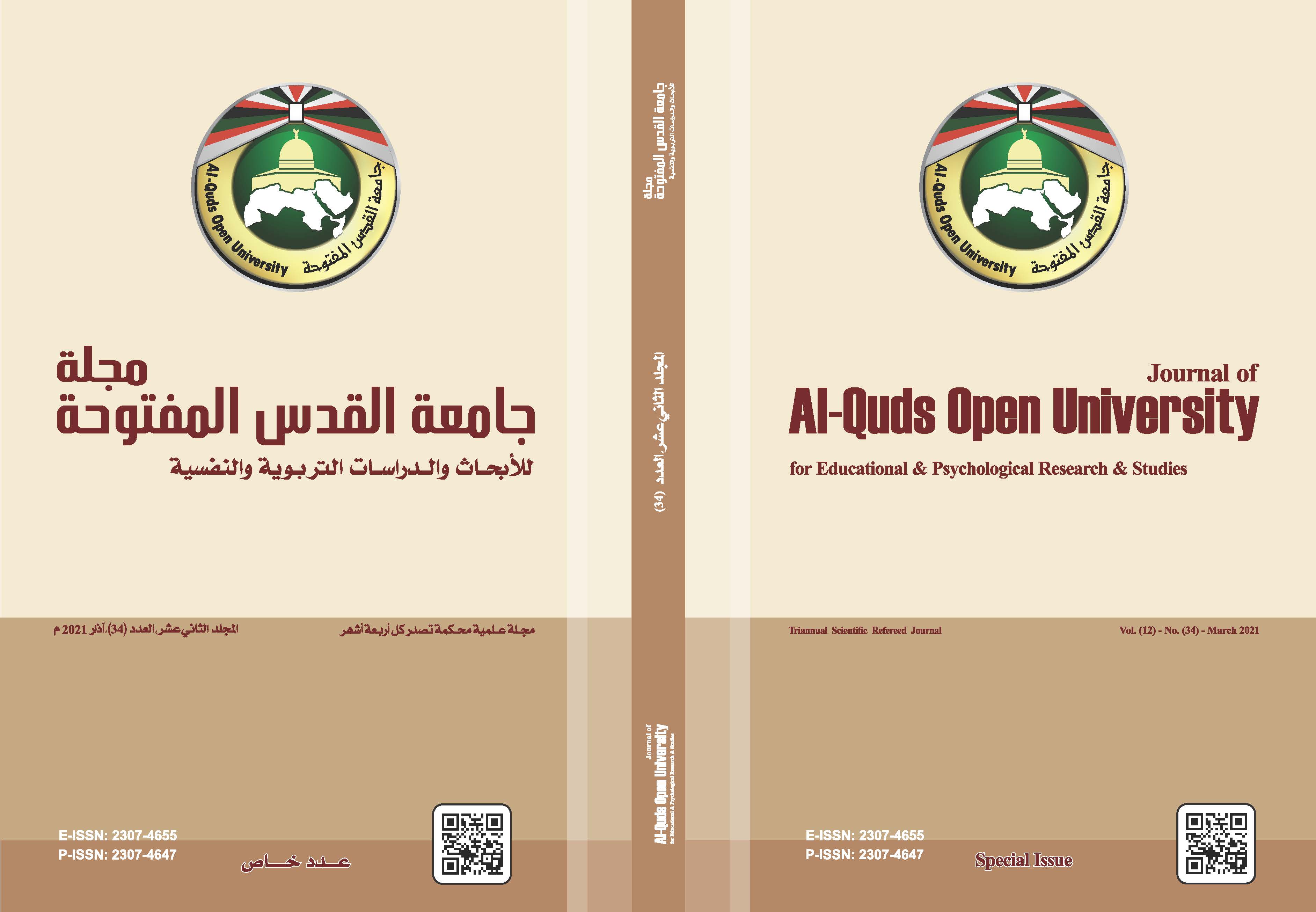The Habits of Mind Included in Geography Textbooks for the Basic Stage in Jordan (Analytical Study)
DOI:
https://doi.org/10.33977/1182-012-034-004Keywords:
Habits of Mind, Basic Stage, Geography Textbooks.Abstract
This study aims to reveal the degree of inclusion of the habits of mind included in the geography textbooks for the basic stage of the sixth to tenth grade and identify how they are distributed, the level of sequence, and continuity in the books. To achieve this goal, the researchers followed the descriptive-analytical method, where they prepared the study instrument, which included sixteen habits of mind built by Costa and Kallick (2012): Persistence, managing impulsivity, listening with understanding and empathy, thinking flexibility, thinking about thinking, striving for accuracy and precision, questioning and posing problem, applying past knowledge to a new situation, think and comminuting with clarity and precision, gathering data through all senses, creating, imagery and innovating, responding with wonder and awe, taking responsible risks, finding humor, thinking interdependently, learning continuously. These habits were verified and validated, and then the geography textbooks were analyzed for the basic stage. The results of the study showed that mental habits were included randomly, and that there is a great disparity in contrast ratios. Some habits were included in high percentages, some in low percentages, some were not included in any book, and the level of sequence and continuity was low in their inclusion.
References
أولاً: المصادر والمراجع العربية
- القشي، يوسف. (2019). اشتمال كتب العلوم الحياتية للصفين التاسع والعاشر الأساسيين في الأردن على عادات العقل ودرجة امتلاك وممارسة معلمي العلوم لها في ضوء بعض المتغيرات. أطروحة دكتوراه غير منشورة، جامعة اليرموك، الأردن.
- أبو السمن، آلاء. (2012). مدى تضمين عادات العقل في مناهج العلوم للمرحلة الأساسية العليا. رسالة ماجستير غير منشورة، الجامعة الهاشمية، الأردن.
- بربخ، إلهام. (2015). عادات العقل وعلاقتها بمظاهر السلوك الإيجابي لدى طلبة جامعة الأزهر- غزة. رسالة ماجستير غير منشورة، جامعة الأزهر، غزة.
- حجات، إبراهيم. (2010). عادات العقل والفعالية الذاتية. عمان- الأردن: دار جليس الزمان للنشر والتوزيع.
- سلوم، طاهر وحمدان، ميساء والقاضي، لمى. (2016). مستوى عادات العقل لدى تلامذة الصف الرابع الأساسي في مادة الدراسات الاجتماعية وعلاقته ببعض المتغيرات. مجلة جامعة تشرين للبحوث والدراسات العلمية- سلسلة الآداب والعلوم الإنسانية، 38 (2)، 137-154.
- شواهين، خير. (2014). عادات العقل وتصميم المناهج المدرسية: النظرية والتطبيق. إربد- الأردن: عالم الكتب الحديث للنشر والتوزيع.
- محمود، صلاح. (2005). تعليم الجغرافيا وتعلمها أهدافه ومحتواه وأساليبه وتقويمه- رؤى للقرن الحادي والعشرين. القاهرة: علا للنشر والتوزيع.
- نوفل، محمد. (2008). تطبيقات عملية في تنمية التفكير باستخدام عادات العقل. عمان: دار المسيرة.
ثانياً: ترجمة المصادر والمراجع العربية إلى اللغة الإنجليزية
- Al-Qashi, Y. (2019). The Inclusion of Biology Textbooks for 9th and 10th Grades in Jordan of Habits of Mind, and Science Teachers' Acquisition and Practicing them in Light of Some Variables, Unpublished PHD thesis, Yarmouk University.
- Abu Al Samen, A. (2012). Inclusion of Habits of Mind in Science Textbooks at the Upper Elementary Stage in Jordan. Unpublished Master Thesis, The Hashemite University, Jordan.
- Barbak, E. (2015). Habits of mind and their relationship with positive behavior manifestations among the students of Al-Azhar University - Gaza. Unpublished Master Thesis, Al-Azhar University, Gaza.
- Hajjat, I. (2010). Habits of Mind and self-efficacy. Amman-Jordan: Jalis Al-Zaman House for Publishing and Distribution.
- Salloum, T., Hamdan, M. & Al-Qadi, L. (2016). The Level of Habits of Mind to Basic Fourth Grade Pupils in Social Studies and its Relationship with Many Variables, Tishreen University Journal for Research and Scientific Studies - Arts and Humanities Series, 38 (2), 137-154.
- Shwaheen, K. (2014). Habits of mind and School Curriculum Design: Theory and Practice. Irbid - Jordan: Modern Book World for Publishing and Distribution.
- Mahmoud, S. (2005). Geography education, learning, goals, content, methods, and calendar - visions of the 21st century. Cairo: Ola for Publishing and Distribution.
- Nawfal, M. (2008). Practical applications in developing thinking using habits of mind. Amman: Dar Al-Masirah..
ثالثاً: المصادر والمراجع الأجنبية
- Altakhyneh, B. & Aburiash, H. (2018). Impact of Habits of Mind in Mathematical Creative Thinking at Amman Schools, An- Najah Univ. J. Res.(Humanities), 32(2), 418-438.
- Andriani, S., Yulianti, K., Ferdias, P & Fatonah, S. (2017) The Effect of Mathematical Habits of Mind learning Strategy based on problem toward Students’ Mathematical Creative Thinking Disposition., IJAEDU- International E-Journal of Advances in Education, 3 (9) , 689- 696.
- Costa, A. & Kallick, B. (2003). Assessment strategies for self–directed Learning. Thousand Oaks, C.A: Corwin.
- Altun, M., Erşen, Z. & Ezentaş, R. (2018). Evaluation of the Teaching Environment for Improve the Geometric habits of Mind of Tenth Grade students, European Journal of Education Studies, 4(6) , 47-65.
- Costa, A. & Kallick. B. (2012). Habits of Mind: Learning guide from Discovering and Exploring Habits of Mind Workshop. Miami: Florida, 6-22.
- Costa, A. & Kallick, B. (2000). Discovering and exploring habits of mind. Alexandria, VA: ASCD.
Downloads
Published
How to Cite
Issue
Section
License
- The editorial board confirms its commitment to the intellectual property rights
- Researchers also have to commit to the intellectual property rights.
- The research copyrights and publication are owned by the Journal once the researcher is notified about the approval of the paper. The scientific materials published or approved for publishing in the Journal should not be republished unless a written acknowledgment is obtained by the Deanship of Scientific Research.
- Research papers should not be published or republished unless a written acknowledgement is obtained from the Deanship of Scientific Research.
- The researcher has the right to accredit the research to himself, and to place his name on all the copies, editions and volumes published.
- The author has the right to request the accreditation of the published papers to himself.







2.png)






_2.png)

